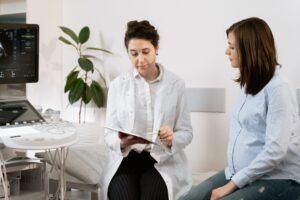How not to lose hope
Reproductive health (according to the World Health Organization) is complete mental, physical, social, and mental well-being, not just the absence of reproductive system dysfunction or disease.
The state of reproductive health is an important indicator of the social and economic development of the country. According to the World Health Organization, the overall morbidity rate among adolescents 15-17 years old increased by 19.5% between 2015 and 2020. The average age of sexual initiation among adolescents is: 13 – 15.5 years old. Earlier sexual activity is accompanied by a number of negative consequences: from unwanted pregnancies to diseases of the sexual system, causing in some cases infertility.
The critical level, according to the WHO, is the rate of infertile marriages (about 15%). In such a marriage both partners or one partner can be infertile.
Adverse industrial factors have a negative impact on reproductive function and reproductive health in general.
There has been an increase in the number of gynecological diseases. Thus, over the past ten years there has been an increase in the percentage of women suffering from endometriosis, inflammatory diseases of the appendages, cervical erosion and other conditions which also lead to infertility.
There are several major factors that have led to the deterioration of reproductive health:
- Adverse occupational factors;
- Adverse environmental conditions;
- Early sexual activity of young people;
- Abortions in primiparous women.
Fortunately, today there are legal reproductive technologies that offer hope for healthy offspring.
The use of assisted reproductive technologies in Ukraine is regulated by a number of legal acts. In particular, these documents define assisted reproductive technologies as methods of treating infertility in which conception and earlier development of the embryo takes place completely or partially outside the mother’s body. These include:
- IVF program;
- Oocyte donation;
- Surrogacy;
- Cryopreservation of germ cells.
Many modern couples, by contacting a fertility agency or clinic, can find real hope for conception and birth. In this kind of agency there is a possibility of artificial insemination with the help of other people’s oocytes. Some women, due to various circumstances (genetic abnormalities, the onset of early menopause, diseases) do not have their own healthy eggs ready for fertilization. In this case, any other healthy woman – an egg donor – can help. The procedure is complicated because donor eggs cannot be stored. Therefore, once a suitable donor is found, it will be necessary to synchronize the menstrual cycles of both women. This is achieved, most often, with the help of a special pharmacological therapy.
A surrogate mother will prove useful if a woman cannot bear a fetus on her own. In this case, conception will require material from the genetic father and the genetic mother. In case a woman is infertile, a surrogate mother can also become a genetic mother. A surrogate mother is a healthy woman of childbearing age who agrees to bear and give birth to a child from the genetic father and mother, and who does not claim to be the mother of the born child.
Despite the reproductive health problems of today’s men and women of childbearing age, modern reproductive technology gives hope even to the most desperate couples!
